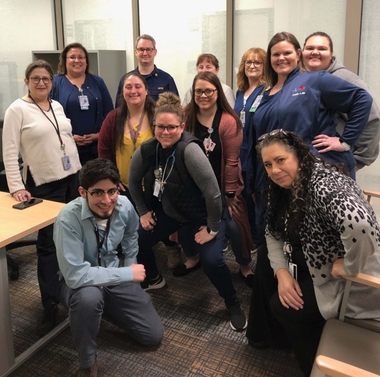Cherokee Nation’s Health System receives HIV services grant

Dr. Jorge Mera and his team at Cherokee Nation Health Services. Photo provided.
by Robin Dorner
Editor in Chief
Cherokee Nation’s Health Services, which includes ten health centers and W.W. Hastings Hospital in northeastern Oklahoma, has received a grant to increase HIV education, testing and to better utilize preventative services, such as PrEP (pre-exposure prophylaxis).
“The grant basically provides us with the necessary funding to inform the public and medical providers of the status of the HIV epidemic in our region,” said Jorge Mera MD, FACP, and the Director of Infectious Diseases at Cherokee Nation Health Services.
“Further, it allows us to implement the interventions that are necessary to decrease the burden of HIV and hopefully eliminate it from our tribal communities. It will also provide the resources to expand our HIV screening, as well as the HIV pre-exposure prophylaxis (PrEP) preventative services.”
He said in order to do more testing, you need to educate the public and providers about the importance of the testing, and to have the resources available to carry it out, which is what the grant provides.
“HIV screenings are carried out throughout the Cherokee Nation’s health system, but PrEP is only available in the new Cherokee Nation Outpatient Health Center in Tahlequah,” said Dr. Mera. “It is our intention to expand PrEP services to all the outlying Cherokee Nation health centers”.
They will primarily be targeting the 14 counties within Cherokee Nation but will also build partnerships with Indian Health Service-funded clinics in Tulsa and Oklahoma City.
“Oklahoma was among one of seven states with the fastest growing number of new HIV cases which is concerning to the Cherokee Nation,” said Mera. “I think the immediate benefit is to be able to offer PrEP immediately to tribal citizens who were not aware of this service or did not have access to it. This will certainly protect these tribal citizens from acquiring HIV.
“Also, like other areas in the US, many patients who are HIV positive do not know their status,” he added. “By increasing HIV testing we will be able to identify these individuals and offer them HIV treatment, so they can have a healthier life and not transmit HIV to others. Most individuals who know their HIV status do not transmit HIV; the problem is individuals who do not know their status.”
He said the long-term benefits are to improve the health of the Cherokee Nation and American Indian population.
The grant was originally given for 12 months ending in the fall of 2020, and is a grant awarded by Indian Health Service.
“We qualified because of our proven track record in Hepatitis C screening and elimination among our tribal citizens,” said Mera. “In the past five years we have rolled out an HCV elimination program that has been very successful and I think that was the reason that IHS chose us to carry out the “End the HIV Epidemic” program in our community.”
Cherokee Nation Health Services has recently opened the largest tribal outpatient health center in the country.
“Cherokee Nation’s reputation for having a model and modern tribal health care system in which we can track our patients definitely helped us get the grant,” Mera said. “Cherokee Nation has a wonderful and innovative group of leaders, administrators and health care personnel that can make this program a success.”
Mera reiterated that Oklahoma is one of the seven states in the US with the highest incidence of HIV.
“Additionally, in the US, there has been an increase in HIV in Native Americans communities between 2010 and 2016,” he said. “I think it is very important that we do everything we can to test and diagnose those individuals who are HIV positive and do not know their status, so we can engage them in treatment.”
He said the grant is also important because Cherokee Nation Health Services can now offer PrEP for those at higher risk of acquiring HIV through sexual transmission and injection drug use, so they do not acquire HIV.
“The bottom line is the Cherokee Nation wants to keep our communities and tribal citizens healthy.”
In light of COVID 19 epidemic, people will be encouraged to stay at home to protect themselves, and less individuals will be accessing health services.
“We will still be offering HIV testing and PrEP, so if anyone is interested in these services please call our hotline and we will make arrangements for that individual to receive testing and/or PrEP services the safest way possible.”
The Cherokee Nation Health Services hotline number is 1-844-PREP-STI (1-844-773-7784). If you do not get an immediate answer, please leave a message and someone will get back with you. To learn more about the Cherokee Nation, please visit www.cherokee.org.
Copyright The Gayly 4/27/2020 @ 5:08 p.m. CST.





